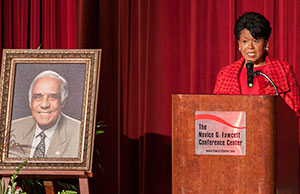Speakers Honor Former Justice Duncan at Memorial Service

Hundreds of family, friends, and colleagues attended a memorial service for Judge Robert M. Duncan on Friday. Justice Yvette McGee Brown served as mistress of ceremonies at the event.

Hundreds of family, friends, and colleagues attended a memorial service for Judge Robert M. Duncan on Friday. Justice Yvette McGee Brown served as mistress of ceremonies at the event.
Speaker after speaker today tried to put into words the impact Judge Robert M. Duncan had on them and countless others at a memorial service on the Ohio State University campus.
Justice Duncan was a trailblazing Ohio jurist who decided the Columbus schools’ historic desegregation case, served on the federal bench, and was a top administrator at Ohio State. He died last week at age 85.
Many who gave tribute spoke of Duncan’s humility, wisdom, generosity, and integrity. Justice Yvette McGee Brown, the first African American woman to serve on the Ohio Supreme Court, served as mistress of ceremonies for the memorial.
Justice Duncan was a jurist of many firsts: the first African American on the Ohio Supreme Court, first African American elected to judicial office in Franklin County, the first to win a seat in a statewide Ohio election, the first to serve on the U.S. Court of Military Appeals, and the first to be appointed to the federal bench in Ohio.
Judge Algenon Marbley of the U.S. District Court for the Southern District of Ohio said Duncan became the conscience of that court during his decade on the bench. He said it was Duncan’s destiny to try the desegregation case, and he handled it with the “deft touch of a surgeon.”
“Within the judiciary, Judge Duncan is without peer,” Judge Marbley said. “No one has served with such distinction at every level such as he.”
Judge Marbley said Duncan gave him the best piece of advice about judging when he advised him to treat every case equally as important as the desegregation case.
David Williams, vice chancellor and law professor at Vanderbilt University, was an OSU law school faculty member when he got to know Duncan. At first, Williams wasn’t aware of Duncan’s legacy. Only after attending a conference marking the anniversary of the U.S. Supreme Court case Brown V. Board of Education did Williams learn more. He said many times people came up to him at the conference and asked “You know Bob Duncan?”
Williams also traveled to South Africa with Duncan three times. He said they were both in awe of Nelson Mandela for his fight against apartheid. But Williams was in awe of Duncan.
“Robert Duncan, Nelson Mandela … same thing to me,” he said.
Columbus Mayor Michael Coleman also spoke at the memorial and listed Duncan as one of the few truly iconic figures in Columbus history.
“True greatness only comes once in a while,” Coleman said. “Years from now, his contributions, his greatness will be seen in the faces of our children who go to school without systematic segregration. This has changed our world.”


